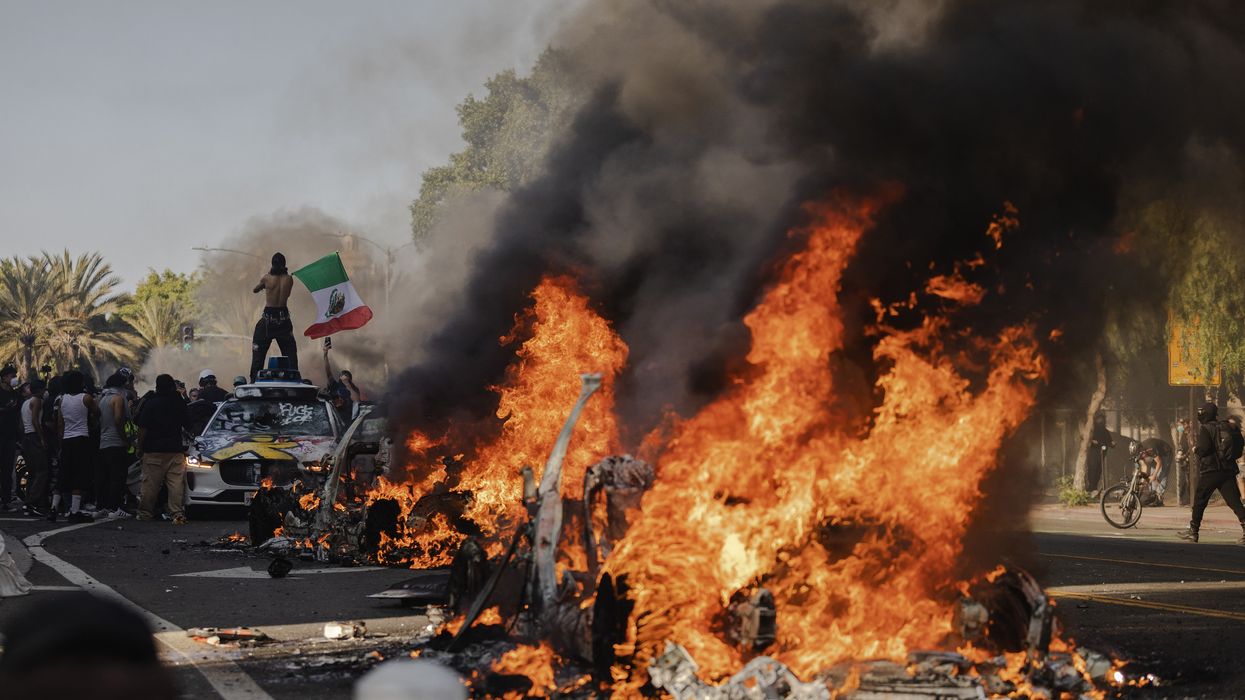PROTESTERS set fire to vehicles and clashed with police in Los Angeles on Sunday after President Donald Trump sent National Guard troops to the city. Officers kept crowds away from the troops, who had been deployed as unrest entered a third day.
The protests were triggered by recent immigration raids carried out by federal officials, which have led to the arrest of dozens of people identified by authorities as undocumented migrants and gang members.
The raids began in broad daylight on Friday in a city with a large Latino population. The deployment of California’s National Guard — usually controlled by the state’s governor — was criticised by opponents who said Trump was escalating tensions. Trump has made strict immigration enforcement a central part of his second-term agenda.
"We didn’t have a problem until Trump got involved," California Governor Gavin Newsom wrote on X.
"This is a serious breach of state sovereignty — inflaming tensions while pulling resources from where they're actually needed. Rescind the order. Return control to California," he added.
At least three Waymo self-driving vehicles were set on fire on Sunday, and two others were vandalised as protesters moved through parts of downtown Los Angeles.
Traffic was stopped for over an hour on a major freeway while people gathered on the road. Officers from the California Highway Patrol dispersed them using flash-bangs and smoke grenades.
After a brief early confrontation outside a detention centre between Department of Homeland Security agents and a few dozen protesters, most clashes involved local police.
By early afternoon, Los Angeles Police Department officers set up containment lines away from federal buildings, keeping demonstrators from reaching armed National Guard troops from the 79th Infantry Brigade Combat Team, who were stationed in camouflage gear and helmets.
As night fell, groups of masked protesters remained in certain areas, with some throwing projectiles and fireworks.
The LAPD said 56 people had been arrested over two days, and three officers had sustained minor injuries.
‘Troops everywhere’
Trump defended the use of troops, suggesting more could be deployed in other parts of the country.
"You have violent people, and we are not going to let them get away with it," he told reporters. "I think you’re going to see some very strong law and order."
Asked if he would invoke the Insurrection Act, which allows the military to operate as domestic police, Trump said: "We’re looking at troops everywhere. We’re not going to let this happen to our country."
US Northern Command, part of the Department of Defense, said "approximately 500 Marines... are in a prepared-to-deploy status should they be necessary to augment and support" federal operations.
The National Guard is usually deployed for natural disasters or, occasionally, civil unrest, with the agreement of state officials.
Trump’s decision to send in the Guard without the governor’s consent is the first such move since 1965, during the civil rights era. Democrats, including former vice president Kamala Harris, criticised it. Harris called the move "a dangerous escalation meant to provoke chaos."
‘Intimidation’
Republicans supported Trump’s decision.
"I have no concern about that at all," said House Speaker Mike Johnson, accusing Newsom of "an inability or unwillingness to do what is necessary".
Protesters told AFP they believed the deployment was meant to deter dissent.
"I think it’s an intimidation tactic," said Thomas Henning. "These protests have been peaceful. There’s no one trying to do any sort of damage right now and yet you have the National Guard with loaded magazines and large guns standing around trying to intimidate Americans from exercising our First Amendment rights."
Marshall Goldberg, 78, said the presence of the troops made him feel "so offended."
"We hate what they’ve done with the undocumented workers, but this is moving it to another level of taking away the right to protest and the right to just peaceably assemble," he told AFP.
ICE raids in other US cities have led to smaller protests in recent months, but the unrest in Los Angeles is the most significant reaction to Trump’s immigration policies so far.
A CBS News poll conducted before the Los Angeles protests showed a slight majority of Americans supported the immigration crackdown.
(With inputs from agencies)





